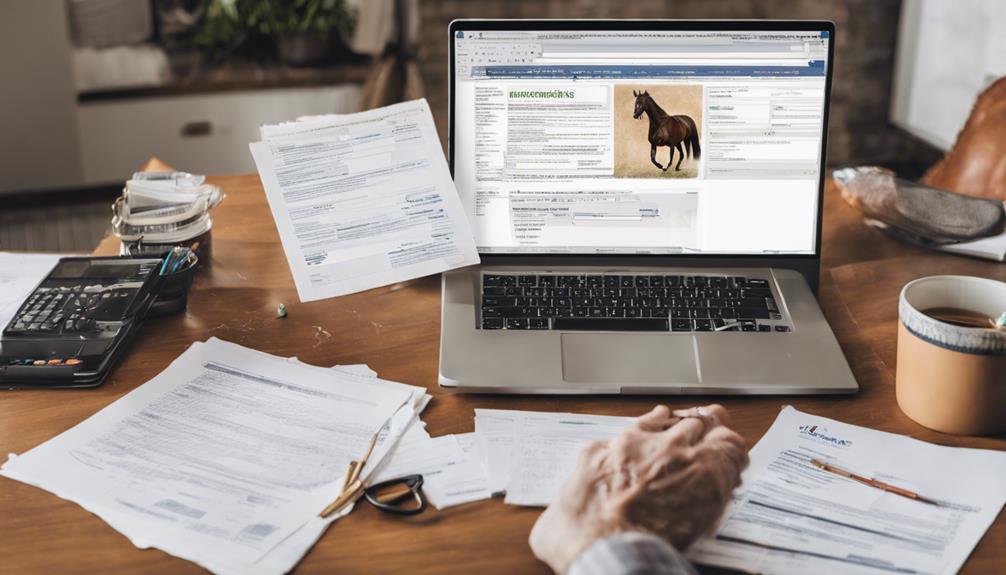Understanding the Monetary Aspects of Horse Adoption
If you've ever considered adopting a horse, you may have come across appealing initial adoption fees that catch your eye. However, before you commit to bringing a horse into your life, it's crucial to understand the full scope of monetary responsibilities that come with horse ownership.
From ongoing maintenance costs to unexpected veterinary expenses, the financial aspect of horse adoption goes far beyond the initial fee. So, before you make that decision, it's essential to grasp the complete picture of what owning a horse entails financially.
Initial Adoption Fees
When considering adopting a horse, you'll encounter various initial adoption fees that cover the cost of the process. Budget planning is crucial to ensure you can comfortably afford these fees. The adoption process typically involves an application fee, which helps cover administrative costs such as background checks and processing paperwork. This fee can range from $25 to $50, depending on the organization.
Once your application is approved, you'll likely encounter an adoption fee. This fee varies widely based on factors such as the horse's age, training, and overall health. On average, adoption fees can range from $500 to $2,000. It's essential to carefully review what's included in this fee, as some organizations may cover initial vaccinations, deworming, or farrier services.
In addition to the adoption fee, you may need to budget for transportation costs if you're adopting a horse from a distant location. These costs can vary significantly based on the distance and mode of transportation. It's advisable to factor in these expenses when planning your budget for horse adoption.
Ongoing Maintenance Costs
To ensure you're financially prepared for adopting a horse, understanding the ongoing maintenance costs is crucial. When budgeting for your horse's care, remember to account for grooming necessities. This includes brushes, hoof picks, shampoos, and other grooming supplies. Regular grooming not only keeps your horse looking good but also helps maintain their overall health by preventing skin issues and promoting good circulation.
Routine check-ups are another essential aspect of horse care that should be factored into your budget. Scheduling regular veterinary visits for vaccinations, dental care, and deworming is crucial for your horse's well-being. Preventative care is key to avoiding more significant health issues down the road. Additionally, consider the cost of routine farrier visits for hoof care and shoeing, which is vital for your horse's comfort and soundness.
When planning for ongoing maintenance costs, it's important to set aside funds for unexpected expenses that may arise. Having an emergency fund for unforeseen veterinary needs or repairs can provide peace of mind and ensure that your horse receives prompt attention when required. By budgeting for grooming supplies, routine check-ups, and unexpected costs, you can better prepare yourself financially for the responsibilities that come with horse adoption.
Veterinary Expenses
Ensuring your horse's health and well-being involves budgeting for veterinary expenses, a crucial aspect of responsible horse ownership. Proper health management begins with preventive care, which includes routine veterinary check-ups, vaccinations, and deworming. These measures are essential for maintaining your horse's overall well-being and preventing costly health issues down the line.
Financial planning for veterinary expenses is crucial. Start by researching local veterinarians to find one that fits your budget without compromising quality care for your horse. Setting aside a portion of your budget specifically for veterinary costs can help you manage unexpected health issues that may arise.
Regular veterinary visits aren't just for emergencies; they're a key component of proactive health management. During these visits, your vet can assess your horse's overall health, provide necessary vaccinations, and offer guidance on nutrition and exercise tailored to your horse's specific needs.
Farrier and Dental Care
Regularly scheduling farrier appointments and dental check-ups for your horse is essential for maintaining their overall health and well-being. Taking care of your horse's hooves and teeth is crucial in preventing potential issues that can affect their comfort and performance.
- Hoof Care
- Ensuring regular visits from a qualified farrier helps keep your horse's hooves in good condition.
- Trimming and balancing the hooves regularly promotes proper weight distribution and prevents lameness.
- Addressing any signs of hoof issues promptly can prevent more significant problems in the future.
- Dental Hygiene
- Scheduling routine dental check-ups with an equine dentist ensures your horse's teeth are healthy and free from sharp points.
- Floating your horse's teeth when necessary helps maintain proper chewing function and overall well-being.
- Detecting dental problems early can prevent discomfort and issues with feeding.
Feed and Supplements
Feeding your horse a balanced diet and considering appropriate supplements is crucial for maintaining their health and performance. Understanding your horse's nutrition requirements and any dietary restrictions they may have is essential in ensuring their well-being. Horses require a diet rich in fiber, vitamins, and minerals to support their overall health. Quality forage should form the basis of their diet, supplemented with concentrates as needed based on their activity level and individual needs.
In addition to meeting their basic nutritional needs, supplements can play a vital role in enhancing your horse's health and performance. Supplements such as joint support products can help maintain healthy joints, particularly in older horses or those in intense training. Omega-3 fatty acids are known for their anti-inflammatory properties and can benefit horses with inflammatory conditions or skin issues. Probiotics are useful in maintaining a healthy gut flora, which is crucial for proper digestion and overall well-being.
Training and Behavior Modification
To optimize your horse's well-being and performance, it's essential to focus on their training and behavior modification. Behavioral training and desensitization techniques play a crucial role in shaping your horse's behavior and ensuring a harmonious relationship between you and your equine companion.
Training and Behavior Modification Tips:
- Consistent Training: Consistency is key when it comes to training your horse. Establish clear communication and boundaries to help them understand what's expected of them.
- Positive Reinforcement: Use positive reinforcement techniques such as treats, praise, or pats to reward good behavior. This will motivate your horse to repeat the desired actions.
- Desensitization Exercises: Introduce your horse to various stimuli in a gradual and controlled manner to help them overcome fears and react calmly in potentially stressful situations.
Insurance Considerations

Considering insurance for your horse is a crucial step in safeguarding their well-being and your financial investment. When exploring insurance options for your equine companion, it's essential to weigh the benefits of different policy options and the associated premium coverage. Horse insurance can provide peace of mind by helping cover veterinary expenses, mortality costs, and liability protection, depending on the chosen plan.
Premium coverage is a key factor to consider when selecting an insurance policy for your horse. The premium is the amount you pay for the insurance coverage, and it can vary based on factors such as the horse's age, breed, discipline, and the level of coverage you choose. Understanding what's included in the premium and any additional costs is crucial to ensure you're adequately protected without overpaying for unnecessary coverage.
When exploring policy options, it's important to assess your horse's specific needs and potential risks. Different insurance plans offer varying levels of coverage, ranging from basic medical care to comprehensive plans that include coverage for surgeries, emergency care, and even loss of use. Evaluating your horse's health, age, and activities can help you determine the most suitable policy that aligns with your budget and provides adequate protection for your beloved companion.
Unexpected Emergency Fund
Creating an unexpected emergency fund for your horse is a proactive measure that can provide financial security in unforeseen circumstances. While budget planning is essential for the day-to-day care of your equine companion, having an emergency fund specifically designated for unexpected situations can help maintain financial stability and provide peace of mind.
Key Points:
- Emergency Fund Purpose: An emergency fund is crucial for covering sudden veterinary expenses, unexpected injuries, or other urgent needs that may arise.
- Budget Allocation: Set aside a specific amount each month to gradually build up your emergency fund, ensuring you're prepared for any unforeseen financial challenges.
- Financial Stability: Having an emergency fund in place can prevent you from dipping into your regular budget or going into debt when unexpected expenses occur, contributing to your overall financial stability.
Frequently Asked Questions
How Can I Budget for Unforeseen Medical Emergencies or Other Unexpected Expenses That May Arise After Adopting a Horse?
When budgeting for unforeseen medical emergencies or unexpected expenses after adopting a horse, it's crucial to have an emergency fund in place. By creating a savings plan specifically for these situations, you can financially prepare for any unexpected costs that may arise.
Financial planning is key to ensuring you can cover any medical needs or emergencies your horse may face, giving you peace of mind and stability in caring for your equine companion.
Are There Any Financial Assistance Programs Available for Horse Owners Who May Be Struggling to Afford Ongoing Maintenance Costs?
If you're feeling overwhelmed by ongoing maintenance costs, there are options like financial aid, grants, and sponsorships available to help you out. These programs can provide much-needed assistance when it comes to affording the care your horse needs.
Additionally, fundraising efforts can also be a great way to gather support from the community and alleviate some of the financial burdens associated with horse ownership.
What Are the Potential Tax Implications of Owning a Horse, and How Can I Ensure I Am Properly Accounting for These Expenses?
To understand the potential tax implications of owning a horse, it's crucial to track expenses diligently. This can help you identify tax deductions related to horse ownership. Keep detailed records of vet bills, feed, equipment purchases, and other horse-related expenses.
Consult with a tax professional to ensure you're accurately accounting for these expenses and maximizing any potential deductions available to you. Tracking your expenses ensures you're prepared come tax time.
How Can I Determine if My Horse Is in Need of Additional Training or Behavior Modification, and What Are the Associated Costs?
To evaluate if your horse needs more training, observe its behavior and consider a professional training evaluation. This analysis will help identify areas for improvement.
If behavioral modification is necessary, research different options and compare prices. Ensure the costs align with your budget.
Are There Any Potential Hidden Costs or Fees Associated With Horse Adoption That I Should Be Aware of Before Making a Commitment?
Before committing to horse adoption, be aware of potential hidden costs. Apart from adoption fees, consider training costs and equipment expenses. The adoption process might involve unexpected fees, so research thoroughly.
Additionally, remember the long-term care responsibilities that come with owning a horse. Stay informed to make a well-rounded decision and ensure you're financially prepared for any unexpected costs that may arise during the adoption process.
Conclusion
Now that you understand the monetary aspects of horse adoption, you can make informed decisions about taking on this responsibility. Remember to consider:
- Initial adoption fees
- Ongoing maintenance costs
- Veterinary expenses
- Farrier and dental care
- Feed and supplements
- Training
- Insurance
- Having an emergency fund.
By being prepared and budgeting wisely, you can provide a loving and stable home for your new equine companion.
